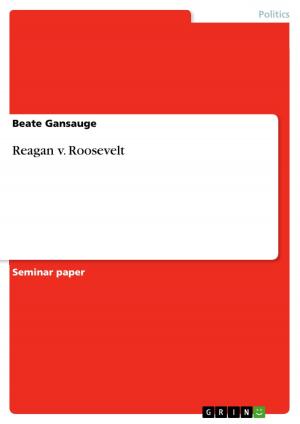Nepal's Economic Landscape: Recommendations for a sustainable Economic Policy
Business & Finance, Economics, Macroeconomics| Author: | Bikal Dhungel | ISBN: | 9783640902224 |
| Publisher: | GRIN Publishing | Publication: | April 28, 2011 |
| Imprint: | GRIN Publishing | Language: | English |
| Author: | Bikal Dhungel |
| ISBN: | 9783640902224 |
| Publisher: | GRIN Publishing |
| Publication: | April 28, 2011 |
| Imprint: | GRIN Publishing |
| Language: | English |
Seminar paper from the year 2011 in the subject Economics - Macro-economics, general, grade: Keine, Cologne University of Applied Sciences, language: English, abstract: The world is changing rapidly. In the last sixty years it has seen miraculous developments. Coming out of the ashes of World War II, Western Europe has established itself as the most stable region of the world. Totally destroyed Japan, having been the victim of the only atomic bomb in human history, which killed hundreds of thousands, has established itself as the strongest economy of Asia, and second only to the United States worldwide. We have seen the rise of South Korea, which had the equal per capita income as Mozambique in late fifties. Today South Korea stands as a developed country. We have seen the growth of China when Mao went. From Deng Xiaoping to Xiang Jemin to Hu Jintao, it kept its economy open and recently overtook Germany as the third largest economy of the world. China is on the way to become the second largest economy. India, from the early ninetees, took similar policy. India grew when the world economy was in downturn. The rise of BRIC (Brazil, Russia, India and China) countries has re-shaped the world order. Mexico proudly declares itself as a North American country today and no more intends to turn back to its old identity as a Central American country. The North American Free Trade Agreement (NAFTA) has been good for Mexican economy as they can sell their products in the United States and Canada now. Indonesia shares similar story. Even though it was runned by one of the terrible dictator of the world, Suharto, he brought liberal policies in the country encouraging Privatisation, Free Trade and more market liberalization. After the Asian financial crisis of 1997, people lost faith in him and finally toppled him. Growth was felt in other parts of the world as well. Emergence of computarized technologies, World Wide Web, digital technologies etc have reshaped the world. Nepal, however, did not change much. Even though it enjoyed the modern developments from other parts of the world, it could not establish itself as a country capable to adopt such changes. There are many things to blame. Ill adviced policies of the past, weak justice system, ineffective education policies, high corruption, nepotism etc are just handful of things. In this paper, I will point out some sectors which need immediate change in Nepal. I will recommend some policy advices and finally analyse some future scenarios in international level which have huge impact on Nepalese economics and politics.
Education: Bachelors in Economics/Business - Technical University of Cologne, Germany Masters in Health Economics - University of Aberdeen, UK Masters in Economic Development - University of Glasgow, UK Summer School in Development & Environmental Economics, London School of Economics, UK
Seminar paper from the year 2011 in the subject Economics - Macro-economics, general, grade: Keine, Cologne University of Applied Sciences, language: English, abstract: The world is changing rapidly. In the last sixty years it has seen miraculous developments. Coming out of the ashes of World War II, Western Europe has established itself as the most stable region of the world. Totally destroyed Japan, having been the victim of the only atomic bomb in human history, which killed hundreds of thousands, has established itself as the strongest economy of Asia, and second only to the United States worldwide. We have seen the rise of South Korea, which had the equal per capita income as Mozambique in late fifties. Today South Korea stands as a developed country. We have seen the growth of China when Mao went. From Deng Xiaoping to Xiang Jemin to Hu Jintao, it kept its economy open and recently overtook Germany as the third largest economy of the world. China is on the way to become the second largest economy. India, from the early ninetees, took similar policy. India grew when the world economy was in downturn. The rise of BRIC (Brazil, Russia, India and China) countries has re-shaped the world order. Mexico proudly declares itself as a North American country today and no more intends to turn back to its old identity as a Central American country. The North American Free Trade Agreement (NAFTA) has been good for Mexican economy as they can sell their products in the United States and Canada now. Indonesia shares similar story. Even though it was runned by one of the terrible dictator of the world, Suharto, he brought liberal policies in the country encouraging Privatisation, Free Trade and more market liberalization. After the Asian financial crisis of 1997, people lost faith in him and finally toppled him. Growth was felt in other parts of the world as well. Emergence of computarized technologies, World Wide Web, digital technologies etc have reshaped the world. Nepal, however, did not change much. Even though it enjoyed the modern developments from other parts of the world, it could not establish itself as a country capable to adopt such changes. There are many things to blame. Ill adviced policies of the past, weak justice system, ineffective education policies, high corruption, nepotism etc are just handful of things. In this paper, I will point out some sectors which need immediate change in Nepal. I will recommend some policy advices and finally analyse some future scenarios in international level which have huge impact on Nepalese economics and politics.
Education: Bachelors in Economics/Business - Technical University of Cologne, Germany Masters in Health Economics - University of Aberdeen, UK Masters in Economic Development - University of Glasgow, UK Summer School in Development & Environmental Economics, London School of Economics, UK















